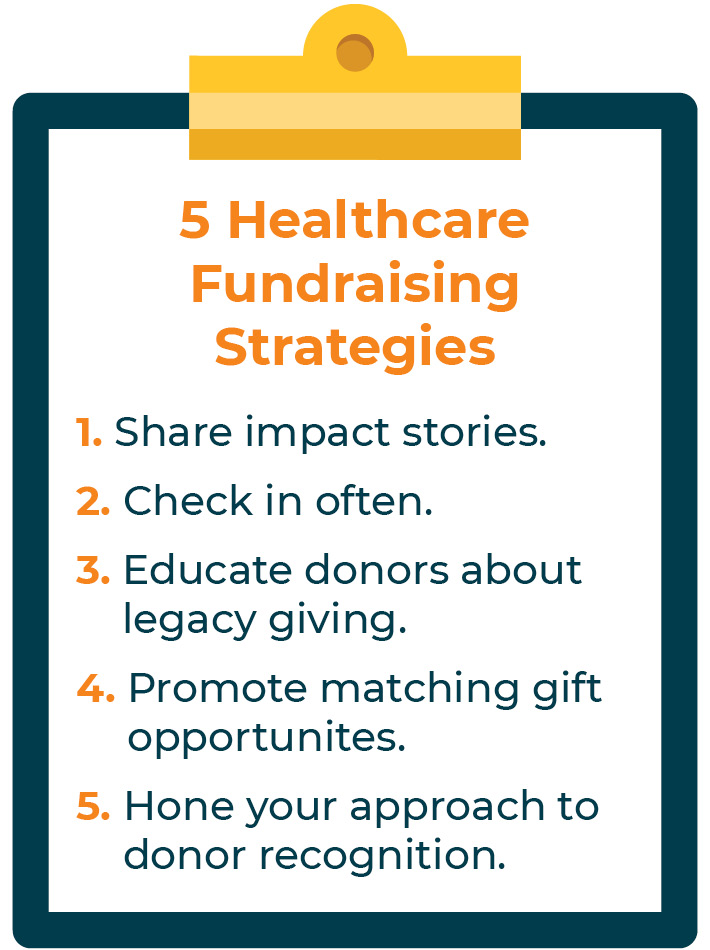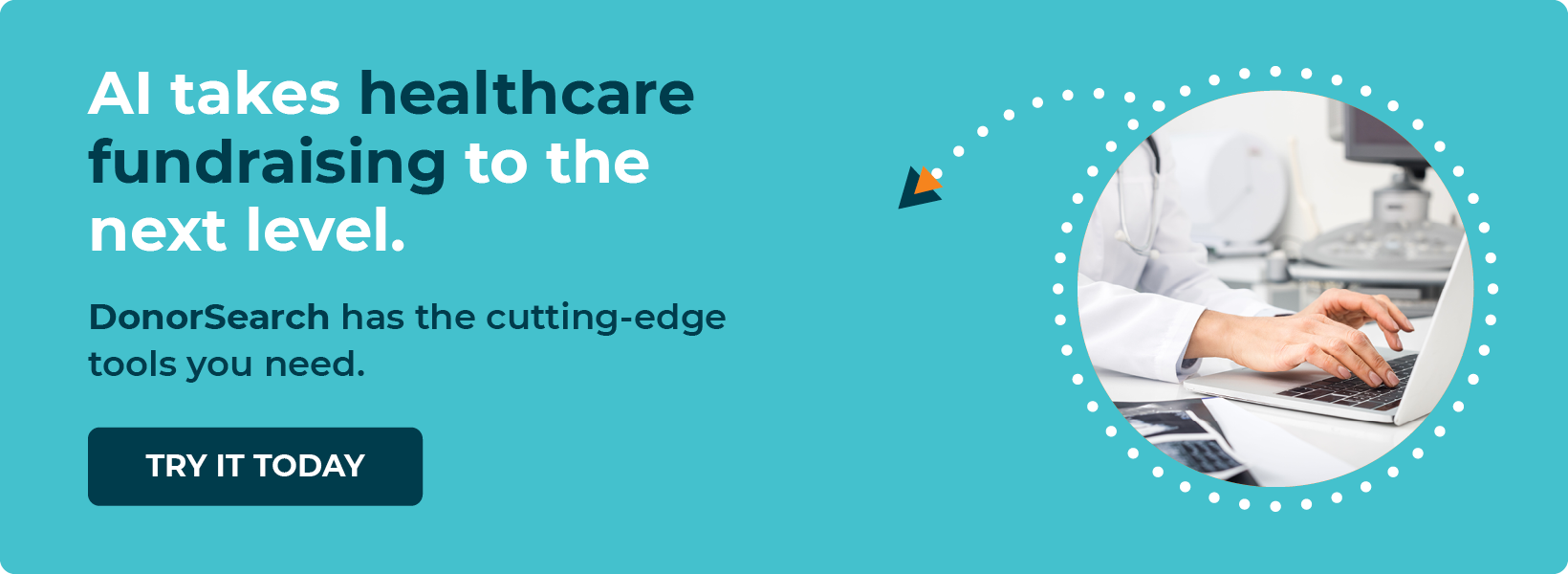
Fundraising for Healthcare Institutions: The Basics to Know
Fundraising is essential for healthcare institutions that want to employ successful development strategies and serve more patients. Plus, a well-constructed fundraising program gives patients and their families a philanthropic outlet to express their gratitude for the healthcare providers that made a difference in their lives. The generous donations these donors give go a long way to help healthcare institutions pay their staff, invest in new technology and equipment, enhance their facilities, and more…
However, navigating the world of donations with the added complexity of healthcare regulations (particularly patient privacy laws) can be challenging. To help you successfully implement a fundraising plan for your healthcare institution, we’ve created this guide. We’ll address the following topics to get you started on the right foot:
- Facing the Challenges of Healthcare Institution Fundraising
- Essentials for Healthcare Fundraising Success
- 5 Strategies for Securing More Donations For Your Institution
- How DonorSearch Ai Can Help With Healthcare Fundraising
An important piece of the healthcare fundraising puzzle is having the right tools on your side. And in this day and age, your healthcare institution can stay one step ahead by leveraging AI tools like DonorSearch Ai. Throughout this guide, we’ll explain how DonorSearch’s advanced tool can help your institution succeed with its fundraising goals. Let’s go!

Facing the Challenges of Healthcare Institution Fundraising
Healthcare fundraising involves many challenges that do not arise in other contexts due to the unique setting and relationships between potential donors (patients) and healthcare providers.
Therefore, when participating in healthcare fundraising, it’s essential to be mindful of the role that healthcare providers play and how they can assist development staff while simultaneously maintaining the privacy and trust of patients.
Let’s explore a few of these challenges so you’re equipped to overcome them.
Data Privacy and Security Rules
Because of healthcare data regulations, like the Health Insurance Portability and Accountability Act (HIPAA), essential fundraising processes like prospect research (also known as screening) and donor stewardship require additional caution.
HIPAA gives patients more control over their health data. It prevents patient health information from being shared with anyone without consent or knowledge. Even in situations where patient information can be shared, it’s important to prevent accidental leaks and privacy violations. This standard of security applies to fundraising.
As you embark on your healthcare fundraising journey, you must ensure that anyone involved in your fundraising strategy, including fundraising partners and platforms, has the highest privacy and data security standards, as even an accidental violation of privacy can pose serious issues for your organization.
For example, at DonorSearch, all of our employees undergo thorough HIPAA training and master our strict data security and file processing methods. These methods are specifically designed with data security in mind and are a leading factor in why DonorSearch is one of the most reliable partners in healthcare fundraising.
Inadequate Data and Information for Prospect Research
In part due to patient privacy laws, one of the biggest challenges healthcare fundraising programs face is securing enough data and information about donors to learn about their philanthropic tendencies, affinity for your institution, and capacity to give—all of which empower you to steward them effectively.
However, not leveraging the right data sources can hinder your ability to find top donors. You’ll need to invest time and money into superior prospect research that utilizes advanced methods for helping you identify top prospects.
DonorSearch’s philanthropic database, the largest globally, ensures that your organization can quickly discover a wealth of prospect data points. In addition, with DonorSearch’s artificial intelligence and machine learning technology, you’ll be able to identify, segment, and categorize top prospective donors to approach stewardship more efficiently.
Donor Stewardship Complexities
Donor stewardship always requires a particular level of care and attention to successfully develop and maintain authentic relationships. No matter who your donors are, preserving the line between professional and personal while still genuinely connecting with a donor is of the utmost importance. When it comes to healthcare fundraising, this is even more essential.
Especially due to the sensitive nature of doctor-patient relationships, how you approach donors is incredibly important for effective healthcare fundraising. To ensure that your donor stewardship goes smoothly, you should:
- Extensively train non-philanthropy stakeholders (doctors, nurses, etc.) to interact with patients in this context
- Ensure that all team members thoroughly understand all patient privacy rules, regulations, and best practices
- Begin stewardship and solicitation with a detailed plan so that everyone is on the same page
Taking the extra time to prepare and educate everyone who plays an active role in donor stewardship will help your team avoid any hiccups from the unique nuances of healthcare fundraising.
Essentials for Healthcare Fundraising Success
There are different types of healthcare fundraising, with grateful patient programs being one of the most well-known forms of hospital fundraising. However, regardless of your fundraising setting, your healthcare fundraising strategy must involve these essential elements.
Robust Prospect Profiles
Prospect profiles are a collection of the relevant data you gathered during the screening process. These help you develop your outreach and solicitation strategies.
Without robust prospect profiles, it will be much harder to get to know your donors and maximize your stewardship and cultivation efforts. With DonorSearch’s AI, machine learning capabilities, and expansive philanthropic database, you’ll be able to reference extensive amounts of publicly-available information that is then used to make predictions about your prospective donors automatically.
This ensures that you can focus your efforts where they are likely to drive the most impact and can effectively adjust your stewardship and solicitation strategy for each individual prospect. This increases your chances of success, but highly individualized and tailored approaches can also improve your relationships with donors.
Some data points you’ll be able to collect with DonorSearch’s database include:
- Real estate holdings
- SEC holdings
- Political contributions
- Business affiliations
- Demographic data
- Consumer data
- Past philanthropic giving
- Involvement in other philanthropic organizations, like board service
This information enables you to form detailed predictions about which donors may be ready to give their first gift, make an additional donation, become major donors, and more. As your philanthropy and healthcare teams work together, your data will play a large role in informing your strategy and giving everyone the information they need to further your institution’s goals.

Grateful Patient Program
A grateful patient program is evidence of the excellent work that your healthcare organization has done. These programs give patients a chance to express gratitude and extend support to the individual staff members and departments that played meaningful roles in their care.
However, successful grateful patient programs require a serious investment of time and resources from your healthcare organization, so it’s crucial that you have all of the following components incorporated into your plan:
- Dedicated staff. Healthcare professionals and leadership will need to be involved, as well as philanthropy experts, in stewarding donors.
- Budget. Identify any technology, stewardship, or marketing costs associated with starting or improving your grateful patient program.
- Privacy guidelines. One of the biggest challenges of working with healthcare data is the strict nature of data privacy laws. Therefore, it’s crucial that your entire team understands all guidelines and abides by them.
- Data processes. Maintaining data hygiene and security will make your program run smoothly.
- Screening processes. Using your data and prospect research, you can identify potential donors or current donors who may be a good fit for a higher donation. DonorSearch’s AI tools can make this process incredibly easy.
- Recruitment strategies. Engaging new potential donors can be difficult in a healthcare setting. Make sure you have clear strategies and best practices for how to engage different donors.
Overall, a grateful patient or giving program is crucial for any successful healthcare fundraising initiative. In addition, the trusted relationships and often life-changing experiences between healthcare providers and patients serve as an excellent foundation for meaningful fundraising.
Comprehensive Training on Philanthropy
When working with healthcare professionals on fundraising, like in a grateful patient program, it’s important to understand that while they may have good relationships with patients, they are not trained philanthropy experts.
That’s why you should ensure that your staff is equipped to navigate those relationships in the context of philanthropy successfully. Additionally, your staff will have to know how to properly use the data in prospect profiles for continued donor stewardship.
Access to fundraising and prospecting data can help your doctors, nurses, and administrators better understand the purpose and goals of philanthropy efforts and enable them to connect more with patients. Once they also understand how to best utilize this data through their philanthropy training, the healthcare professionals collaborating with you on your fundraising strategy will be able to successfully fulfill their crucial role.
5 Strategies for Securing More Donations For Your Institution
Once you’ve found prospective donors to steward, you’ll need the right strategies on your side for building relationships and making successful donation asks. Here are five strategies you can leverage to pull in more support for your institution:

1. Share impact stories.
Donors need to know how their contributions will make a difference. By sharing impact stories of how donations have helped you increase your ability to serve your patients, you can inspire them to give.
Whether you share these stories on a web page, through a video, on social media, or through conversation, ensure that you’re setting up your storytelling to engage donors. For example, on social media, you might (with permission) share pictures of someone who benefitted from new equipment your hospital was able to purchase. Or, you might collect testimonials from grateful patients to include in a brochure about your program.
2. Check in often.
As with any relationship, a relationship with a donor will depend greatly on your consistent efforts to interact with them and get to know them. Even before making a donation ask, ensure that you’re checking in often, whether you’re calling your prospect on the phone, sending them an email, or meeting with them for a cup of coffee.
Making an effort to build a genuine relationship with your prospect will increase their trust in your institution and help them to see the human side of your fundraising efforts.
3. Educate donors about legacy giving.
Legacy giving, also known as planned giving, involves donors allocating a large gift to your institution that you receive after the donor passes away. Legacy gifts are popular with donors because they:
- Empower donors to leave a lasting legacy with their favorite organizations
- Allow for sizeable tax breaks
- Let donors who may not be in a position to give a major gift in the present give a major gift at a later date
Too often organizations treat legacy gifts as rare surprises, not putting methodical effort into seeking these donations. You can change this perception and secure more legacy gifts by creating a legacy gift program and promoting the opportunity to your donors. To recognize legacy gift donors in a meaningful way, create a legacy giving society so that donors can meet and interact with other donors who are interested in committing to a planned gift to your institution down the line.
4. Promote matching gift opportunities.
Matching gifts are a form of corporate philanthropy in which employers financially match their employees’ charitable contributions to organizations like nonprofits or healthcare institutions.
For example, if a donor gives $50 and their employer matches donations at a 1:1 ratio, the employer will contribute $50, essentially doubling the donor’s gift without making them reach back into their wallet.
The biggest barrier to receiving more donations through matching gifts is the fact that many donors are simply unaware of their eligibility status. Empower them to learn whether their employer offers gift matching and to submit their information by embedding a matching gift database on your website. Some providers even offer auto-submission capabilities that kickstart the gift-matching process.
5. Hone your approach to donor recognition.
A little “thank you” can go a long way in encouraging donors to not just give once, but to give again in the future. Use what you’ve learned about your donors during the stewardship process to thank them for their donations in ways that will be meaningful to them and will encourage further engagement with your organization down the line.
Some popular thank-you methods include:
- Writing a thank-you letter
- Sending an eCard
- Gifting branded merchandise (hats, t-shirts, sweatshirts, etc.)
- Gifting a gift card to a local restaurant or retailer
- Including a donor’s name on a donor recognition wall (for major gifts)
Even before you’ve secured a donation, you should thank your donors for their time and willingness to learn more about your institution and its fundraising goals. Genuine gratitude will always help you build more rapport.
How DonorSearch Ai Can Help With Healthcare Fundraising
When it comes to managing your donor data, creating robust profiles, and identifying your top prospects for stewardship, there is no better partner than DonorSearch.
DonorSearch has the next generation of fundraising tools that utilize artificial intelligence and machine learning to identify prospects more accurately than ever before.
DonorSearch Ai has incredibly accurate prospect prediction capabilities that can make a huge difference in your donor stewardship efforts. Some of the predictions include:
- Who is going to donate in the next 12 months
- Non-donors most likely to make their first gift
- Donors are most likely to make a recurring gift
- Donors most likely to give over $250
- Donors most likely to respond (engagement score)
- Best way to reach out to a donor
While artificial intelligence is great for automating and optimizing, the added benefit of machine learning means that the longer you use DonorSearch Ai, the better the algorithm will become at making predictions for your unique set of donors and prospects.
AI fundraising is the future. With DonorSearch, you can take your health fundraising to the next level! Check out the video below to learn how a healthcare fundraising consultant elevated their fundraising efforts with DSAi:
Wrapping Up
There is a lot of complexity to wade through when it comes to fundraising for your healthcare institution. To overcome the challenges you’ll face, you’ll need an excellent team trained in healthcare philanthropy, but you’ll also need access to the right tools and comprehensive fundraising knowledge. DonorSearch Ai is the key that will set your organization apart and help you attract the support you’re seeking.
Looking for further reading? Here are some recommended resources:
- Major Gifts: A Guide to Securing Large Donations. Major gifts are the largest donations that your organization receives and require careful fundraising efforts to secure. Learn more in this guide.
- 16+ Prospect Research Tools To Find More Donors For Your Org. The right toolkit can make all the difference in your prospecting efforts. Check out our list of top tools.
- Nonprofit Fundraising Metrics: 32 KPIs To Measure Success. Keep track of your fundraising progress by tracking and evaluating metrics. Here are 32 to get you started.

